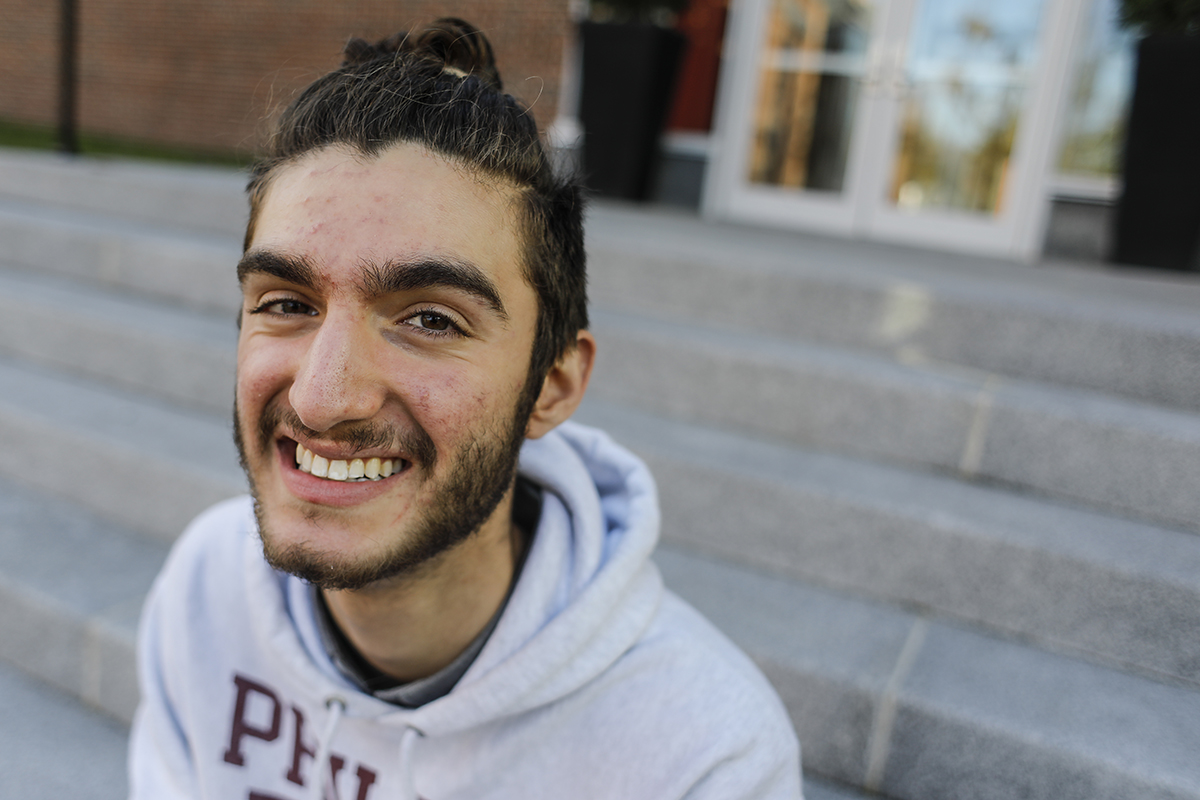Najafi in the Lamont Quad, the location of his senior project.
Cameron Najafi

Sound Theories
Deep diving on subjects he is passionate about is Cameron Najafi’s thing, and one of many reasons he is grateful to be at Exeter. A senior from Phoenix, Arizona, Najafi is an avid proponent of environmentalism and sustainability, which he has pursued as a member of the Academy’s Climate Action Day Planning Committee, as an Environmental Proctor and, perhaps most significantly, through a senior project with his mentor, Adjunct Music Instructor Jon Sakata.
“Dr. Sakata and I met in the late fall of my upper year,” Najafi recalls. “We share a strong interest in architecture and sustainable design, and started exchanging long, philosophical emails on those topics. He introduced me to the concept of two states of mind: the ‘territorialized’ mind, which is our everyday mindset that is grounded in reality and holds to social rules, and the ‘deterritorialized’ mind, which escapes social rules and critiques and is the domain of artists, writers and philosophers. Because Dr. Sakata is an artist, he has offered me that lens for seeing the world. I’ve grown a huge appreciation for literature and art as a result.”
That appreciation, in turn, has given birth to the concept for Najafi’s senior project. Working closely with Sakata, he is exploring how art, psychology and sociology are embedded in architecture and, in particular, how sound impacts built environments and the human experience. If all goes according to schedule, Najafi will soon present plans for an art installation in the Lamont Quad, the green space in front of the Lamont Health & Wellness Center and in back of Phelps Science Center. Because each of those facilities has generators proximately situated, the site is known for its ambient noise, which Najafi, in his installation, may or may not exploit. “This quad is an interesting focal point, a confluence of music, science, health and nature, and there isn’t a space quite like it anywhere else on campus. Through my installation, I hope to play with and emphasize these intersections.”
Locus
Najafi stumbled upon the Academy by chance. An avid reader, he had picked up Best Intentions: The Education and Killing of Edmund Perry (Vintage Books, 1988), by Sam Anson, which details the schooling, at Exeter, of Edmund Perry ’85, and his tragic death just as he is about to begin his freshman year at Stanford. Anson’s descriptions of the environment at Exeter and of the subjects that its students hashed out in their classes intrigued Najafi, then a student at Phoenix Country Day School (PCDS).
Proverbial fuel to fire came when Najafi and his PCDS classmates were later asked to undertake a project exploring the pedagogical styles of a host of different schools. While not in the group that presented on Exeter, he was nonetheless astounded to learn during class presentations that the Academy offered 450 courses. “I thought that was so cool,” he recalls. Inspired, he began researching and applying to East Coast independent schools. Accepted to both Exeter and Andover, he selected the former, he explains, because of Harkness. “I stumbled a lot as a speaker and hoped Harkness would help; I know it has.”
Burgeoning
Other transformations have come about. Najafi says that, before Exeter, he had a tendency to “go inward” when it came to pursuing his interests. “I spent lots of time reading on my own,” he explains. “When you do that in isolation, it’s easy to go down a path and put blinders on — to get tunnel vision. Yes, I learned lots of ideas, but many were incomplete or flawed. At Exeter, I’ve been able to develop ideas with others, and that’s been a really great experience. Here it’s been a nice relief not to shut out the influence of others, but to open up.”
Intentional rumination has likewise facilitated Najafi’s metamorphosis. A co-head of Exeter’s Buddhist Meditation, he says he’s gone from being a “quasi-meditator” to developing a deeper understanding of the spiritual aspects of the practice. Strong connections to fellow students have been another happy result. “I met my friend Alexander [Renaud ’18] a year ago when we started talking one evening after meditation. Now we are always exchanging different ideas about mindfulness. Just last week he was encouraging me to feel the space around me as I am walking.”
Possibilities
As Najafi works to vivify the concepts of his senior project, he says he is thankful for the “exponential growth” he has experienced at Exeter, a stretching of the mind that is preparing him for collegiate studies in international development or political economy. “Long term, I have an interest in sustainable cities,” he says. Just how those cities might harmonize the environmental with the social to enhance the well-being of inhabitants may one day be Najafi’s opus.
